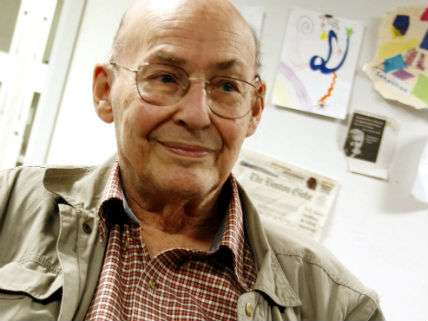Artificial Intelligence Pioneer and Transhumanist Marvin Minsky Dies at Age 88
Until the time that Minsky is either revived or uploaded, may he rest in peace

Marvin Minsky founded what became M.I.T.'s Artificial Intelligence Laboratory in 1959. The New York Times' obituary notes:
Marvin Minsky, who combined a scientist's thirst for knowledge with a philosopher's quest for truth as a pioneering explorer of artificial intelligence, work that helped inspire the creation of the personal computer and the Internet, died on Sunday night in Boston. He was 88. …
Well before the advent of the microprocessor and the supercomputer, Professor Minsky, a revered computer science educator at M.I.T., laid the foundation for the field of artificial intelligence by demonstrating the possibilities of imparting common-sense reasoning to computers.
I had the pleasure and privilege of chatting with Minsky a couple of times at various transhumanist events. As I reported from Transvision 2007:
On Wednesday at Transvision 2007, Marvin Minsky, the artificial intelligence guru who heads up MIT's Media Lab, puckishly suggested we could solve any population problem by uploading the minds of 10 billion people and running them on a computer that occupies a few cubic meters and costs only a few hundred dollars to run. …
Minsky's talk, "Matter, Mind and Models," dealt with how he thinks the field of artificial intelligence (AI) went off track. He blamed "physics envy" on the part of AI researchers who sought some simple set of principles that would underlie and explain intelligence. This strategy failed, but researchers made a lot of progress in "narrow" AI. Minsky argued that human brains have a lot of different "ways to think" so that if one way doesn't work or solve the problem, it doesn't get stuck. Brains can split problems into parts, simplify, make analogies, and so forth. Current AI programs generally rely on just one main strategy and therefore tend to get stuck. In addition, Minsky claimed that the evolutionarily recent parts of the human brain recognize patterns of activity in other parts of the brain. In particular, those parts of the brain recognize when other parts are trying to solve problems. The brain can reflect on its own activities. Reflection is the missing ingredient in narrow AI research-reinforcement learning networks, rule-bases systems, neural networks, and statistical inference.
Minsky is not shy about speculating on what the future may hold. Once researchers understand how brains work, "we will discover ways to upload our minds into machines." He predicted that our AI descendants (what AI researcher Hans Moravec called our mind children) will eventually escape from this planet and spread throughout the universe. "If we are the only intelligence in the universe, then we are obligated to ensure that the universe remains meaningful," said Minsky. We sat at a table together over lunch and it was amusing to see some of the more Marxist-inclined transhumanists express horror when Minsky explained that he thought that democracy was not such a good idea. Why would anyone want to be governed by a majority of stupid people, he wondered.
Minsky is evidently a member of Alcor, and so will likely be cryopreserved. Until the time that he is either revived or uploaded, may he rest in peace.


Show Comments (74)